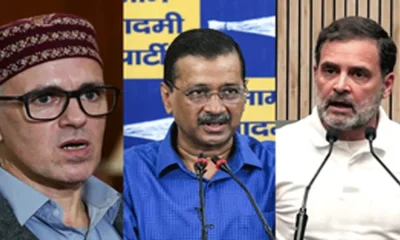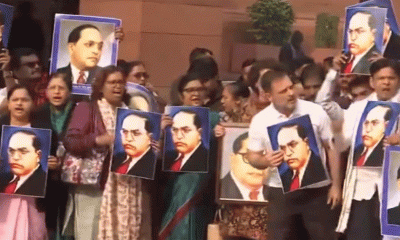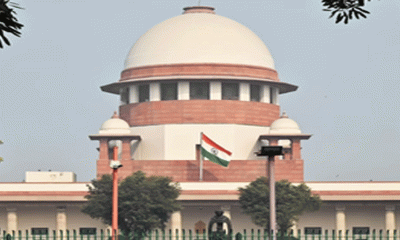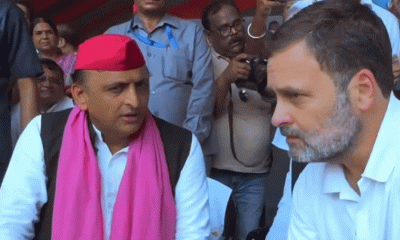Politics
Freedom fighters pics in Udaipur showcase Congress’ revamped strategy

As part of the Congress’s revamped strategy, images of freedom fighters – in addition to party stalwarts – figure in posters flanking the streets of Udaipur where its three-day conclave ‘Chintan Shivir’ is underway and are catching the attention.
Besides the Gandhi family, leaders, and party presidents, pictures of freedom fighters like Subhash Chandra Bose, Sarojini Naidu among others can also be seen in the posters.
Earlier, posters of Mahatma Gandhi, Jawaharlal Nehru and Gandhi family members besides CM or party presidents would dominate the camps and conventions. However, this time, the freedom fighters have been given equal importance, sources said.
According to them, the change follows BJP’s criticism that Congress only remembers select leaders and ignores the contributions made by leaders like P.V Narasimha Rao, Subhash Chandra Bose, Lala Lajpat Rai and other freedom fighters.
So, this time, the grand-old party has given a befitting reply, though silently, to the allegations of nepotism through these posters, said a political analyst.
At several places, posters of Narasimha Rao can be seen with Manmohan Singh, Babasaheb Bhimrao Ambedkar with Maulana Abdul Kalam Azad, Lal Bahadur Shastri with Dr Rajendra Prasad, Bhagat Singh with Gopal Krishna Gokhale, Sardar Vallabhbhai Patel with Pandit Jawaharlal Nehru, Mahatma Gandhi with Lala Lajpat Rai, Subhash Chandra Bose with Rabindra Nath Tagore and Sarojini Naidu have been displayed.
Meanwhile, Ajay Maken, State in-charge said: “The party has always recognised and remembered the freedom fighters. BJP and RSS was never seen far and wide in the freedom struggle.”
National News
ACC Locks Asia Cup Trophy With Instructions Of Not Be Handed To Team India Without Mohsin Naqvi’s Presence
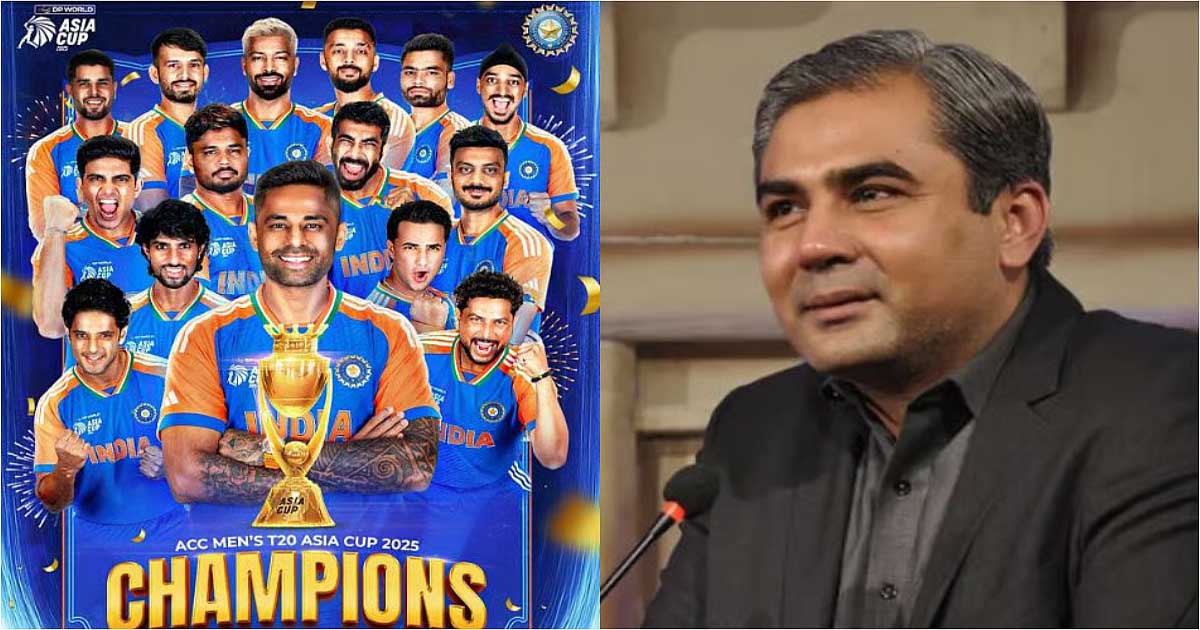
Lahore: The Asia Cup trophy, which was not presented to the victorious Indian team after its refusal to accept it from Asian Cricket Council chief Mohsin Naqvi, has been locked away at the ACC’s Dubai headquarters with “instructions that it should not be moved or handed over” without the Chairman’s approval.
The trophy has been at the ACC office after Naqvi walked away with it from the presentation ceremony following the Indian team’s refusal to accept it from him. India beat Pakistan in the Asia Cup final in Dubai on September 28.
Naqvi is also the Pakistan Cricket Board (PCB) Chairman and the Interior Minister of his country and India-Pakistan tensions have hit a peak after the Pahalgam terror attack.
“As of today the trophy is still in ACC offices in Dubai with clear intructions from Naqvi that it should not be moved or handed over to anyone without his approval and in person presence,” a source close to Naqvi told PTI.
“Naqvi has given clear instructions that only he will hand over the trophy in person (whenever that happens) to the Indian team or BCCI,” he added.
The entire Asia Cup was overshadowed by Indo-Pak hostilities. The Indians refused to shake hands with the arch foes throughout the tournament and players from both sides mocked each other with politically charged gestures.
Naqvi too made political statements on his social media pages.
The BCCI took strong exception to his act of walking away with the trophy and vowed to raise the matter in an ICC meeting next month. It is being widely speculated that a strong move to get Naqvi censured and even removed as Director in the ICC could be made.
“It remains to be seen what will be the long term ramifications for the PCB or Naqvi because the BCCI is clear he (Naqvi) didn’t have any right to insist on handing the trophy himself to the Indian team and refusing to send it to the BCCI who were official hosts of the event,” the source said.
National News
Nine Maharashtra Districts Included In PM Dhan Dhanya Krishi Yojana To Boost Farmer Income And Self-Reliance
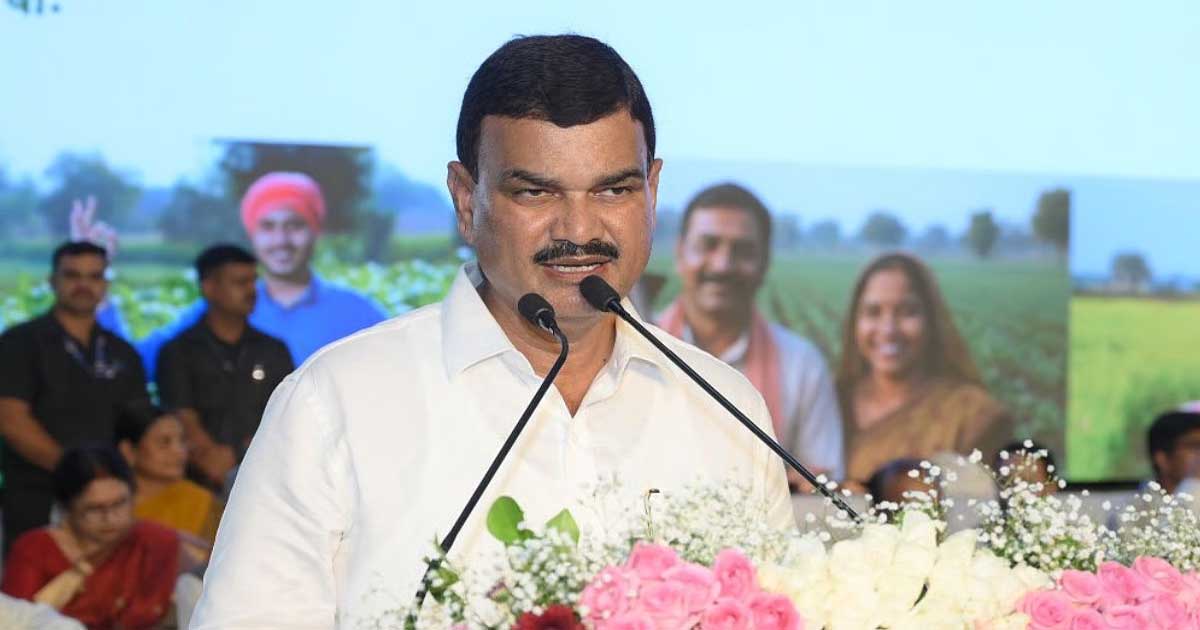
Mumbai: “The Prime Minister Dhan Dhanya Krishi Yojana marks a decisive step towards increasing farmers’ income and making them self-reliant,” said Maharashtra Agriculture Minister Dattatray Bharane. “After consistent efforts for farmers’ justice, this is a significant achievement. The Central Government has included nine districts from Maharashtra in the scheme, which will be inaugurated tomorrow in Delhi by Prime Minister Narendra Modi. I urge farmers across the state to actively participate in this initiative,” Bharane added.
A state-level event for Maharashtra will be held tomorrow under the chairmanship of Agriculture Minister Dattatray Bharane at the Pune District Central Cooperative Bank Auditorium.
The Prime Minister Dhan Dhanya Krishi Yojana (PMDDKY) has been launched by the Central Government to improve the condition of farmers in regions with low productivity, limited irrigation facilities, and inadequate access to agricultural credit. A total of 100 districts across India have been selected under the scheme, including nine from Maharashtra—Palghar, Raigad, Dhule, Chhatrapati Sambhajinagar, Beed, Nanded, Yavatmal, Chandrapur, and Gadchiroli.
The scheme aims to promote agricultural improvement, crop diversification, productivity enhancement, and sustainable farming. It will be implemented over the next six years, with an annual budgetary provision of ₹24,000 crore. In the selected districts of Maharashtra, the focus will be on grain storage, processing, irrigation improvement, and local employment generation.
Minister Bharane welcomed the decision, saying, “This scheme will directly benefit farmers across the state. It will strengthen sustainable agriculture, water conservation, and the adoption of modern technologies—boosting farmers’ confidence. This initiative truly means ‘strength to farming, relief to farmers’.”
More than 300 progressive and innovative farmers are expected to attend tomorrow’s event. Under this program, 36 different schemes from 11 departments of the Central and State Governments will be implemented in convergence. The activities will be executed at multiple levels—Gram Panchayats, Krishi Vigyan Kendras (KVKs), Agricultural Market Committees, Kisan Samriddhi Kendras, and Cooperative Credit Societies (PACS).
Currently, over 36 central and state agricultural schemes are being converged to boost crop productivity, ensure sustainability, and strengthen post-harvest technology and credit systems. The nationwide launch of the PM Dhan Dhanya Krishi Yojana, Natural Farming, and Pulses Campaign will be conducted through live broadcasts at district headquarters, KVKs, taluka offices, Gram Panchayats, and agricultural institutions.
Representatives from local bodies, agriculture departments, universities, scientists, award-winning farmers, natural farming practitioners, and farmer producer companies will participate in these events.
Minister Bharane also extended his gratitude to Prime Minister Narendra Modi and Union Agriculture Minister Shivraj Singh Chouhan for including nine districts from Maharashtra under this ambitious and farmer-friendly initiative.
International News
Pakistan fears losing more than diplomatic ground with Kabul turning to India
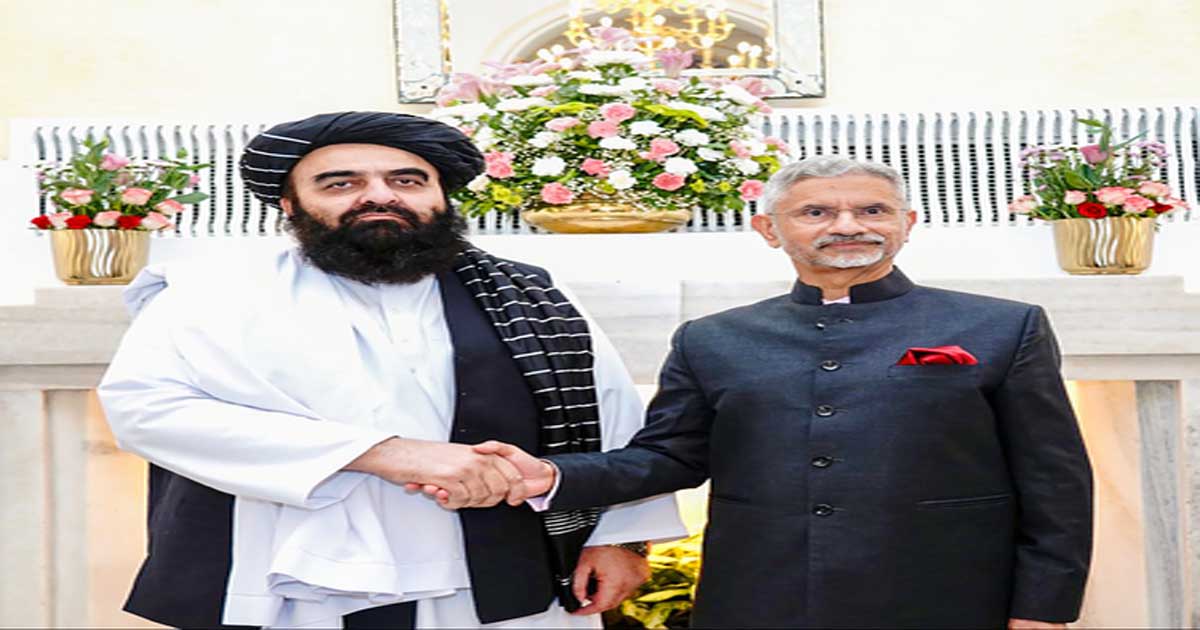
New Delhi, Oct 10: Pakistan could never imagine that a group it once raised and used to spread terror in neighbouring countries would one day run a government and realise that diplomacy does not flow out of the barrel of a gun.
When on the receiving end, Pakistan’s Defence Minister Khawaja Asif stated that Islamabad has “run out” of patience over the use of Afghan soil by “terrorists targeting Pakistan”.
He has also made a bizarre statement, claiming that Afghans have always stood beside India “yesterday, today, and tomorrow”.
If indeed his country had offered support to Afghan refugees, it was to raise a militia, not out of compassion. And all these rhetorics come when Afghanistan’s Foreign Minister Amir Khan Muttaqi is visiting India.
Pakistan has itself soured its relationship with the Taliban, attacking Afghanistan’s border areas, even resorting to aerial bombing, and driving back thousands of refugees from its land to an uncertain future.
Kabul has always refused to recognise the Durand Line – then hurriedly drawn by British occupiers – as a legitimate border.
The porous areas have witnessed intermittent skirmishes, affecting trade and transit. After the withdrawal of US-led troops, Islamabad expected the Taliban to remain eternally grateful and jump to its bidding, but the regime’s assertiveness has disrupted that. Kabul’s diplomatic overtures towards New Delhi have unsettled Pakistan.
While India does not officially recognise the Taliban regime, its pragmatic engagement signals a shift in Kabul’s foreign policy orientation. For Pakistan, this represents a strategic loss and a potential threat.
India’s growing ties with Kabul, combined with its strategic partnership with Iran, amplify these fears.
Possible increase in India’s diplomatic and trade relation with nations in Pakistan’s immediate neighbourhood blow winds of caution for Islamabad.
Meanwhile, Pakistan’s economic ties with Afghanistan have also suffered, with border closures, refugee deportations, and diplomatic tensions having disrupted transit routes.
India’s investment in alternative corridors like the International North–South Transport Corridor (INSTC) and Chabahar bypasses Pakistan entirely.
But following the re-imposition of sanctions against Iran and the Chabahar Port in particular, foreign companies became reluctant to participate in the port’s expansion.
India took over operations in 2018, and used it for trade with Iran and other countries, and also send relief materials to Kabul. Islamabad is eyeing Muttaqi’s India visit warily, fearing diplomatic isolation, where, with India engaging Afghanistan, Iran, and other Central Asian nations, Pakistan risks being left out of regional dialogues.
Increased Indian presence could lead to constricting its operations in intelligence gathering, surveillance, and influence over the region. Thus, Afghanistan’s tilt towards India adds pressure on Pakistan’s western flank.
The Taliban’s refusal to act as Islamabad’s proxy and India’s growing goodwill among Afghans have reshaped the strategic landscape. Pakistan’s view of India’s advantage in Afghanistan is shaped by a sense of strategic reversal.
What was once a zone of influence has become a source of insecurity.
India’s soft-power diplomacy, infrastructure investments, and pragmatic engagement with the Taliban have allowed it to gain ground practically without boots on the ground.
Islamabad now faces two main challenges – managing deteriorating ties with the Taliban and countering India’s expanding influence. But given utterances like those by Khawaja Asif, both seem distant for Pakistan.
As regional dynamics evolve, Afghanistan will remain a critical point in South Asia’s geopolitical chessboard – one where Pakistan’s traditional playbook may no longer suffice.
-

 Crime3 years ago
Crime3 years agoClass 10 student jumps to death in Jaipur
-

 Maharashtra1 year ago
Maharashtra1 year agoMumbai Local Train Update: Central Railway’s New Timetable Comes Into Effect; Check Full List Of Revised Timings & Stations
-

 Maharashtra12 months ago
Maharashtra12 months agoMumbai To Go Toll-Free Tonight! Maharashtra Govt Announces Complete Toll Waiver For Light Motor Vehicles At All 5 Entry Points Of City
-

 Maharashtra1 year ago
Maharashtra1 year agoFalse photo of Imtiaz Jaleel’s rally, exposing the fooling conspiracy
-

 National News12 months ago
National News12 months agoMinistry of Railways rolls out Special Drive 4.0 with focus on digitisation, cleanliness, inclusiveness and grievance redressal
-

 Maharashtra11 months ago
Maharashtra11 months agoMaharashtra Elections 2024: Mumbai Metro & BEST Services Extended Till Midnight On Voting Day
-

 National News1 year ago
National News1 year agoJ&K: 4 Jawans Killed, 28 Injured After Bus Carrying BSF Personnel For Poll Duty Falls Into Gorge In Budgam; Terrifying Visuals Surface
-

 Crime12 months ago
Crime12 months agoBaba Siddique Murder: Mumbai Police Unable To Get Lawrence Bishnoi Custody Due To Home Ministry Order, Says Report



